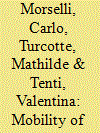| Srl | Item |
| 1 |
ID:
106141


|
|
|
|
|
| Publication |
2011.
|
| Summary/Abstract |
This article reviews evidence from past research that addresses diverse themes and theories regarding shifts and patterns in the mobility of criminal groups. Our main objective is to identify push and pull factors that will help us understand how and why criminal groups, organisations or general organised crime patterns are present across a variety of settings (i.e. geographical locations, criminal markets and legitimate industries). Push factors refer to forces which drive criminal groups from a setting. Pull factors refer to forces which draw criminal groups to a setting. A distinction is also made between contexts in which offenders organise around available opportunities (the strategic context) and contexts in which opportunities induce greater organisational levels amongst offenders (the emergent context). The most general statement that can be formulated from the present exercise is that opportunities matter more than the group itself. What we demonstrate is that the problems concerning geographical locations, criminal markets and legitimate industries that are vulnerable to organised crime are persistent and stable over time. Groups that seize such opportunities, on the other hand, are transient and more than often short-lived. Aside from reviewing past research in search of such factors, we also apply the general understanding that emerges from our analysis to critically assess case studies that reflect popular images of organised crime threats in Canada during recent years. The concluding section identifies the key issues that must be addressed within this area.
|
|
|
|
|
|
|
|
|
|
|
|
|
|
|
|
| 2 |
ID:
085232


|
|
|
|
|
| Publication |
2008.
|
| Summary/Abstract |
This paper examines the impact of increasing criminal cooperation programmes for police handler-informant relationships. Over the last two decades, many countries have introduced policies to regulate the use of criminal informants and defendants who agree to provide information or testimony in exchange for financial incentives, protection, and leniency. Many researchers assume this trend has no bearing on the relationship between the handler and the informant. Following this assumption, they maintain that agreements made with criminal trade participants are still informally negotiated and unsupervised. I investigate this oversight, drawing on data obtained from in-depth interviews with handlers and informants. Findings from this fieldwork illustrate that, in order to compensate for weakening of their discretionary power, police officers are developing new deceptive tactics in dealing with informants. Furthermore, the increasingly institutionalised use of informants has given handlers a false sense of security. Informants gain skills and knowledge from their relationship with handlers, which they can use to undermine the handler's authority.
|
|
|
|
|
|
|
|
|
|
|
|
|
|
|
|